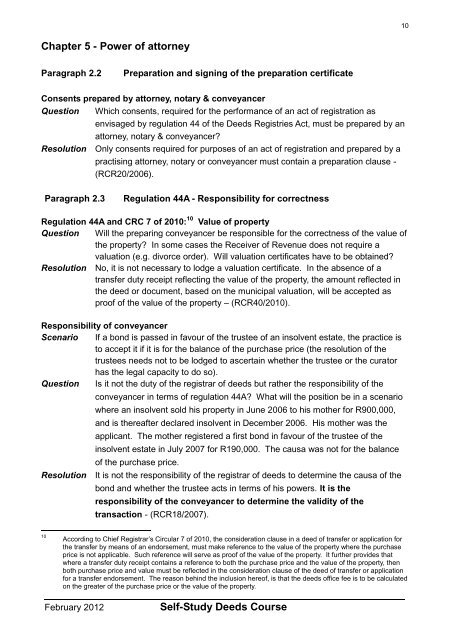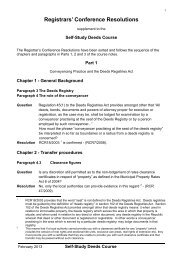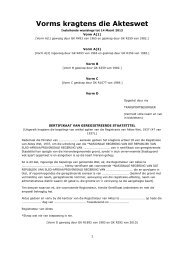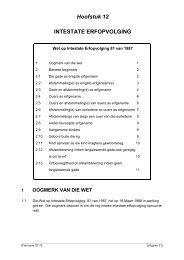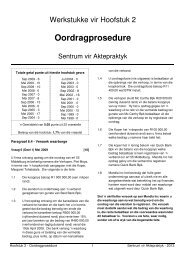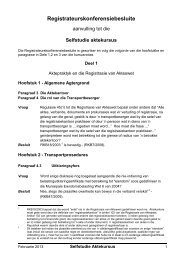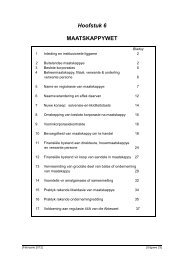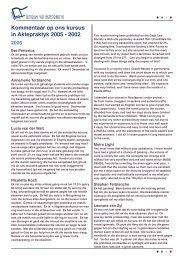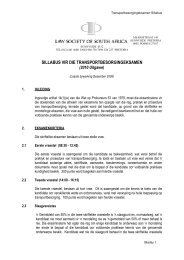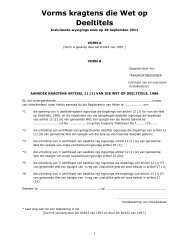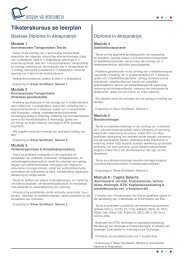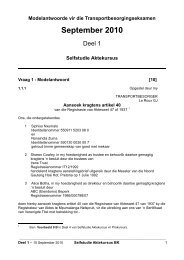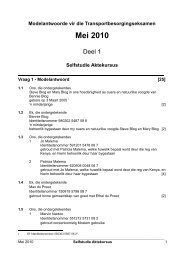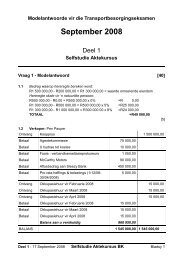Conference Resolutions - Centre for Conveyancing Practice
Conference Resolutions - Centre for Conveyancing Practice
Conference Resolutions - Centre for Conveyancing Practice
Create successful ePaper yourself
Turn your PDF publications into a flip-book with our unique Google optimized e-Paper software.
Chapter 5 - Power of attorney<br />
Paragraph 2.2 Preparation and signing of the preparation certificate<br />
Consents prepared by attorney, notary & conveyancer<br />
Question Which consents, required <strong>for</strong> the per<strong>for</strong>mance of an act of registration as<br />
envisaged by regulation 44 of the Deeds Registries Act, must be prepared by an<br />
attorney, notary & conveyancer?<br />
Resolution Only consents required <strong>for</strong> purposes of an act of registration and prepared by a<br />
practising attorney, notary or conveyancer must contain a preparation clause -<br />
(RCR20/2006).<br />
Paragraph 2.3 Regulation 44A - Responsibility <strong>for</strong> correctness<br />
Regulation 44A and CRC 7 of 2010: 10 Value of property<br />
Question Will the preparing conveyancer be responsible <strong>for</strong> the correctness of the value of<br />
the property? In some cases the Receiver of Revenue does not require a<br />
valuation (e.g. divorce order). Will valuation certificates have to be obtained?<br />
Resolution No, it is not necessary to lodge a valuation certificate. In the absence of a<br />
transfer duty receipt reflecting the value of the property, the amount reflected in<br />
the deed or document, based on the municipal valuation, will be accepted as<br />
proof of the value of the property – (RCR40/2010).<br />
Responsibility of conveyancer<br />
Scenario If a bond is passed in favour of the trustee of an insolvent estate, the practice is<br />
to accept it if it is <strong>for</strong> the balance of the purchase price (the resolution of the<br />
trustees needs not to be lodged to ascertain whether the trustee or the curator<br />
has the legal capacity to do so).<br />
Question Is it not the duty of the registrar of deeds but rather the responsibility of the<br />
conveyancer in terms of regulation 44A? What will the position be in a scenario<br />
where an insolvent sold his property in June 2006 to his mother <strong>for</strong> R900,000,<br />
and is thereafter declared insolvent in December 2006. His mother was the<br />
applicant. The mother registered a first bond in favour of the trustee of the<br />
insolvent estate in July 2007 <strong>for</strong> R190,000. The causa was not <strong>for</strong> the balance<br />
of the purchase price.<br />
Resolution It is not the responsibility of the registrar of deeds to determine the causa of the<br />
bond and whether the trustee acts in terms of his powers. It is the<br />
responsibility of the conveyancer to determine the validity of the<br />
transaction - (RCR18/2007).<br />
10 According to Chief Registrar’s Circular 7 of 2010, the consideration clause in a deed of transfer or application <strong>for</strong><br />
the transfer by means of an endorsement, must make reference to the value of the property where the purchase<br />
price is not applicable. Such reference will serve as proof of the value of the property. It further provides that<br />
where a transfer duty receipt contains a reference to both the purchase price and the value of the property, then<br />
both purchase price and value must be reflected in the consideration clause of the deed of transfer or application<br />
<strong>for</strong> a transfer endorsement. The reason behind the inclusion hereof, is that the deeds office fee is to be calculated<br />
on the greater of the purchase price or the value of the property.<br />
February 2012 Self-Study Deeds Course<br />
10


